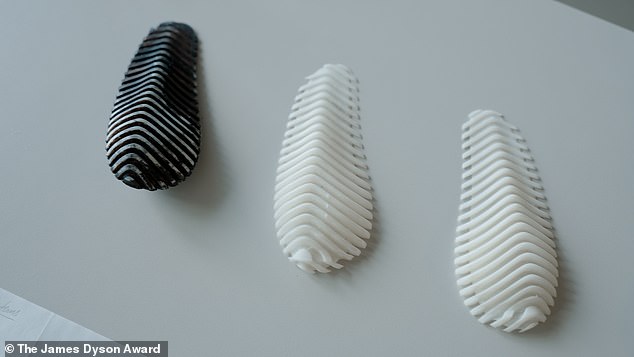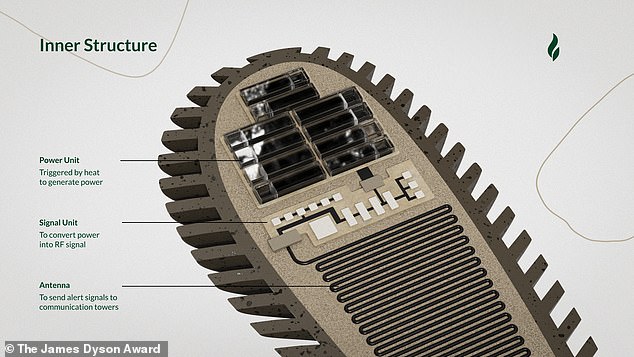Bizarre pinecone-shaped device wins UK’s prestigious James Dyson Award – but do you know what it does?
Every year, the James Dyson Award recognizes the most creative inventions from around the world.
This year’s British winner is a bizarre pinecone-shaped device that has been hailed as ‘awesome’.
The oddly shaped block has no moving parts, almost no metal and is composed mainly of charcoal and wax.
And strangest of all, the invention is designed to be dropped from helicopters over remote forest areas.
Do you know what this strange, unusual device called ‘Pyri’ is supposed to do?
Every year the James Dyson Award rewards the most innovative inventions in the world. Can you tell us what the British winner will have to do this year?
Although it may be difficult to tell at first glance, the Pyri device is designed to help prevent forest fires by providing early warning to local communities.
Pyri’s design is inspired by ‘pyriscent’ pine trees, whose seeds are only released when their resinous exterior melts during wildfires.
Like the pinecones, the outside of the device is made of wax that melts as the temperature of a fire approaches 80°C (176°F).
When the outer shell melts, a saltwater solution is released. The electrolytes produce a small electric current that powers a radio transmitter.
That radio signal is strong enough to be detected by towers that can triangulate Pyri’s signal over a distance of 50 km (31 miles).

The strange device, called the Pyri, has no moving parts, is made mainly of wax and charcoal and is designed to be dropped from a helicopter. Pictured is co-inventor Richard Alexandre
This data can then be sent to local communities and fire services so they can provide early warning of forest fires.
The young inventors of Pyri are Richard Alexandre, Karina Gunadi, Blake Goodwyn and Tanghao Yu. They met while studying at Imperial College and the Royal College of Art in London.
Richard Alexandre says: ‘As a Brazilian, I have a personal connection to the solution we have created, after seeing first-hand the devastation caused by the forest fires in the Pantanal.
‘As this devastation seems to continue around the world, we hope that Pyri will help us detect fires early enough to protect the planet from future disasters, and provide this solution to the communities that need it.’
The device is also designed in such a way that it fits in seamlessly with nature in terms of shape and materials used.

The Pyrie is designed as an early warning system for forest fires. When the device melts at 80°C (176°F) it produces a signal that can be detected by nearby radio towers
Pyri uses only non-toxic materials, so it has no negative impact on the ecosystem, regardless of whether it is burned or left in the forest.
Even the wiring for the radio transmitter is made without metal, instead using a carbon-rich charcoal composite that can conduct electricity.
Thanks to its unique saltwater system, Pyri also does not require a lithium or cobalt battery. Burning would release dangerous fumes.
If metal absolutely must be used, the device uses only a very small amount of non-toxic metals, such as aluminum.
In addition, thanks to its robust, power-free design, Pyri is cheap to produce, easy to use and requires no maintenance.

The device contains salt water that is released when the outer shell melts. The electrolytes in the water produce a signal that creates a radio frequency from an antenna made of a carbon-rich charcoal composite
According to Alexande, the devices could even be dropped from firefighting helicopters over remote parts of the forest to build a detection network.
This network could use existing communications antennas or special receivers that can pick up signals from Pyri.
Only three towers would be needed to cover an area of 2,000 square kilometers.
Rumyana Dancheva, James Dyson Award UK judge, said: “I am delighted that Pyri is the national winner of this year’s James Dyson Award UK as it is a wonderful example of an innovative idea solving a growing global problem.”
The prize winners, Mr Alexandre and his team, will receive £5,000 to further develop Pyri.

Inventor Richard Alexandre says he hopes the device can be dropped over forests to give local people early warning of fires and help limit damage.
This money will be used to develop a working prototype and to continue collaboration with the communities that would most benefit from this invention.
This year’s runners-up in the UK’s James Dyson Award include a device that helps people with Parkinson’s disease walk without difficulty and metal-free RFID tags for the fashion industry.
Pyri only won the British section of the international competition, so her creation will now also be seen on the international stage.
The international winner of the prize will be chosen by Sir James Dyson from a shortlist of national winners. The results will be announced on 13 November.
The team behind the internationally winning design will also receive a prize of £30,000 to develop their project.
